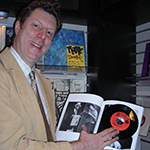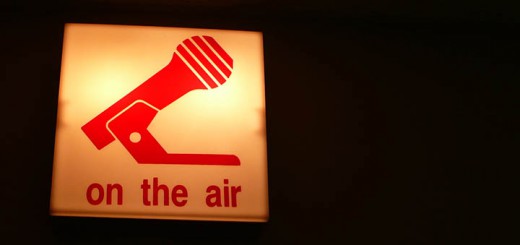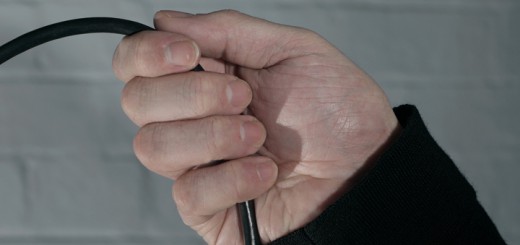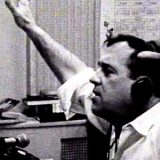Keep Your Hands Off Our Stream
Phil Schaap is a man caught in the middle. On one side there’s the Columbia University administration. On the other, SoundExchange, the non-profit organization that collects and distributes music royalties for Internet streams. What have Internet streams got to do with podcasting? Imagine that streaming is part of your podcast distribution plans, either as a main channel or one that augments your podcast by allowing you to play music. As streaming becomes a viable distribution medium for podcast content in 2016, podcasters might find themselves standing shoulder to shoulder with Schaap, with everyone caught between a rock and a hard place.
Streaming and All That Jazz
Schaap has broadcast jazz on WKCR-FM*, Columbia University’s legendary radio station, for 46 years. But he’s far more than a program host. He grew up, steeped in jazz, in Hollis, Queens, which he describes as jazz’s bedroom community in New York. He left his former day job—a successful career producing, remastering, and writing for record companies such as Columbia, Savoy, and Verve—to work with Jazz at Lincoln Center, where he is its curator. He is a jazz educator. And his WKCR programs reflect all of that.
With an educator’s desire to share knowledge, Schaap is given to producing radio specials that focus on the lives and careers of jazz artists. And that’s why Schaap is getting squeezed.
His retrospective programs feature a single artist, and that runs afoul of one of SoundExchange’s regulations for music streams. Streams cannot play the same artist more than two times in an hour.
“Many other stations, most of them public broadcasters, do retrospectives,” Schaap told me by phone from his Jazz at Lincoln Center office in Manhattan. “I don’t know of anyone who’s been fined for breaking those rules.” If there have been fines, Schaap likened them to the old joke about the person who gets a parking ticket. “You pay the two dollars and park there again,” he said.
Getting a University Education
Columbia University, the licensee of WKCR-FM, has taken a different tack. Late last year, the administration told the station’s student board of directors to obey SoundExchange’s rules** or take down the stream. The reasons are complex, with roots stretching back the early 1970s.
“Since 1970, the station has enjoyed complete autonomy in its programming,” Schaap said. That autonomy was an outgrowth of the student uprising at Columbia in 1968. Over 45 years later, that autonomy still upsets some faculty and administration members who feel WKCR could be repurposed. One staff member I spoke with, who requested anonymity because of ongoing discussions, suggested the administration was using the SoundExchange rules to put a crimp in fundraising and eventually take the station out of student hands. Schaap pointed out that the educational purpose the station serves, preparing students for broadcasting careers, meshes with the mission of a university like Columbia.
“I’m proud of so many WKCR alumni finding jobs in broadcasting. Indeed, I’ve been training our student broadcasters for over 40 years and was writing employment recommendations for 2015 graduates and proposed candidates for ’16 graduation in this very month,” he said. Schaap also was clear that his disagreement with the University administrators is not a turf war over who controls the Columbia airwaves.
“I am not so much clashing with our alma mater as wondering if the University understands the minor miracle that we have created with WKCR,” Schaap said. “That miracle should last. Lasting requires Columbia University’s endorsement of the endeavor and its help.”
Whether the reasons are legal, political or both, the ramifications are dramatic. Over the years, WKCR’s online stream has connected the station to fans and alums who no longer live in the New York metropolitan area. That connection has been responsible for tens of thousands of desperately-needed dollars. Turning off the stream has turned off that fundraising lifeline, too.
Good Intentions and the Road to Hell
The purpose of SoundExchange’s rules are, nominally, to discourage people from making digital duplications of streamed music. Back when the rules were promulgated perhaps they made sense. But with today’s sophisticated hardware and software, plus the almost infinite availability of music on the Internet (much of it on YouTube), what might have been good intentions a decade ago are having draconian effects today. Right now, if you decide to stream content, SoundExchange and, indirectly, the hosting/streaming company you use, has de facto control over your creative choices the moment they run afoul of SoundExchange’s regulations. The situation is especially onerous because the regulations can be used to exert leverage far afield from the problem they were designed to solve.
According to the New York Times, WKCR is negotiating with both SoundExchange and the university administration to find a way to restore the station’s online stream. Meanwhile, Schaap can only wonder about the irony of the situation. “”The station has become a prominent voice in New York City, presenting music not commercially viable,” Schaap said, noting that over the last 46 years he’s helped raised a lot of money for WKCR. “If I’d raised that sum for the football team, I’d be a hero.”
You might want to follow the negotiations, then make your voice heard by contacting both SoundExchange and your congressional representatives. It’s one thing to be standing shoulder to shoulder with Phil Schaap.
It’s another to find yourself there because your online stream is being dammed, too.
**The three of interest here are no more than 4 tracks by the same featured artist (or from a compilation album) may be transmitted to the same listener within a 3 hour period (and no more than 3 of those tracks may be transmitted consecutively; no more than 3 tracks from the same album may be transmitted to the same listener within a 3 hour period (and no more than 2 of those tracks may be transmitted consecutively); [no content that allows] the listener a reasonable foreknowledge of the transmission of a specific sound recording at a specific date and time (e.g., by the use of a published advanced program, playlist, announcement, etc.). Source: http://www.soundexchange.com/service-provider/licensing-101/
Phil Schaap has broadcast Jazz on the radio for over 46 years. Most familiar, perhaps, is his daily show Bird Flight on Charlie Parker heard on WKCR. Phil Schaap has been involved with Jazz at Lincoln Center since its inception in 1987 and has been its Curator since 2000. Upon becoming Curator at Jazz at Lincoln Center Phil Schaap left a successful career producing, remastering, and writing for record companies such as Columbia, Savoy, and Verve. Schaap productions garnered many Grammies including 3 for producing, 3 for historical writing, and two for audio engineering. As an educator, Phil has taught Jazz previously at the graduate level at Columbia and Rutgers. Schaap’s undergraduate teaching career was highlighted by his 14 years at Princeton. Today, Phil teaches at the Graduate School at Juilliard and runs Swing University for Jazz at Lincoln Center.
[jetpack_subscription_form title=”Get Every Blog Post” subscribe_text=”Enter your address to receive every new post by email.” subscribe_button=”Join Us >>”]











It is too bad from a legal standpoint that Columbia University – New York City is apparently a private institution. If it was a public entity/government agency-owned college, different rules would apply — specifically, the public entity/government agency, as licensee of the station, could not directly make programming decisions, because that could be considered “state action” and require public hearings and other official steps. Instead, the public entity/government agency would only, in my opinion, have the option of firing the station management and replacing it with someone else sharing the same view as the public entity/government agency licensee.
Hi Dave…
That’s interesting. And, maybe it’s why many radio stations at public colleges have gone that route. Here in LA, the major public radio stations are (a) affiliated with colleges and (b) run by paid professional staffs. At these stations, students serve as interns but do little on-air work. At WKCR, students can still work on the air (AFAIK).
The whole situation makes me sad. As Schaap said in our interview, WKCR is a minor miracle. That’s what I thought of it when I worked there as an undergrad. I couldn’t believe the broadcasting education I was getting, not from professional staffers, but from other students. Many of these, most notably Robert Siegel, have gone on to long and successful radio careers. WKCR has done just fine under student control from the days when it was the Columbia University Radio Club. I’m sure it will do just fine under student control far into the future. Thanks for keeping the discussion going.
–jay